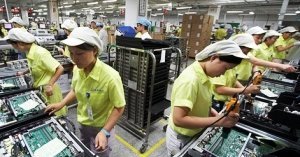In parallel with a rapidly expanding economy, China experiences growing problems of exploitation and lack of safety, as well as a dramatic increase in the gap between social classes. Traits of authoritarianism and antidemocratic behaviour of the present Chinese political regime can be found abundantly in China’s official trade union, which has some 150 million members, and is the only one recognized and accepted by the government. It is a union devoid of democratically elected delegates, and whose only aim is to avoid disorders and protests.
Before his arrest in 1989, Dongfang had tried to found an independent trade union (the Autonomous Beijing Workers Federation), but after the bloody events that took place in Tiananmen Square, his organization was dissolved. Thereafter, his contacts with local representatives of the official trade union, and particularly his vain attempts to establish acceptable working conditions in coal mines, led him to conclude that the trade union was not reformable, least of all ’from the top’.
Being a convinced non-violent activist, Dongfang started basing his action on media battles, which he is still fighting more or less clandestinely from Hong Kong (where he resides and is hardly ’tolerated’ by the authorities), insisting on the demand that the laws in force be applied. In fact, it is important to notice that laws protecting workers do exist in China; only, all too often, they fail to be applied. For instance, there is a law which limits the weekly working hours to 40, with a maximum of 36 hours overtime. Nonetheless, in many areas people work 10 hours a day seven days a week. How to respond to such violations? Certainly not by resorting to strike, which is forbidden by the law unless the lives of workers are in danger, but by turning directly to courts. This is why Dongfang is encouraging the viewers of his TV program Radio Free Asia (20-30 millions on average) to go to court personally and individually to demand, no more no less, the observance of the laws sanctioning infringements of fundamental rights to health and safety.
an economy cannot develop if it keeps regarding human beings as mere tools
From a strictly international point of view, it should also be stressed that China should conform to the international standards provided by the organizations it belongs to. According to Epifani, welcoming China into the International Labour Organization without imposing it to observe the laws on human rights, such as those prohibiting child labour and night shifts for women, has been wrong. On the other hand, we must recognize that the international community – the EU included – has been putting pressure on Beijing for some years to make China change its tune. Moreover, several western trade unions have established relations with the official Chinese trade union. Their presence is very important, especially for the ethical dissuasion they can exert on businesses; even by going as far as to create scandals… Many businesses strongly value their public image,, and the fear of being pointed at as exploiters can be decisive.
Conclusion
All in all, there is no reason to be too pessimistic. According to Dongfang, an economy cannot develop if it keeps regarding human beings as mere tools. The human person must regain a position of centrality. The Communist Party itself is realizing this, as proved by the fact that it shows a ferocious face on the one hand, but promises to put in place a fairer system on the other. As Epifani rightly stresses, capitalism has always boosted individual freedom. So far, China has based its economic development on the imitation of foreign models, on mass production, infrastructures and heavy industry – unlike India, for example; but it will have to start developing know-how of its own and counting on technological innovation, sooner or later. Thus, the culture of innovation and the need to play on creativity and risk will inevitably determine an expansion of freedom.

Follow the comments: |
|
